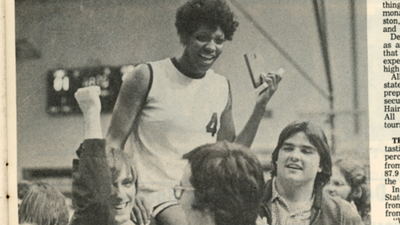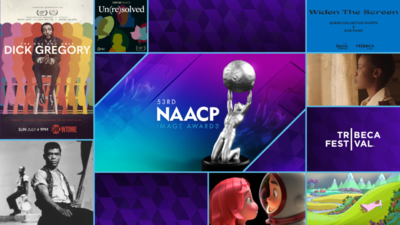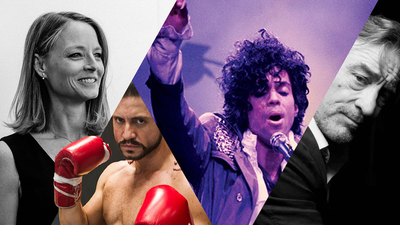
BY MATTHEW ENG |
Quick-Change Artist: How Kristen Wiig Became a Character Actress We Can Believe In
Nobody disappears these days like Kristen Wiig.
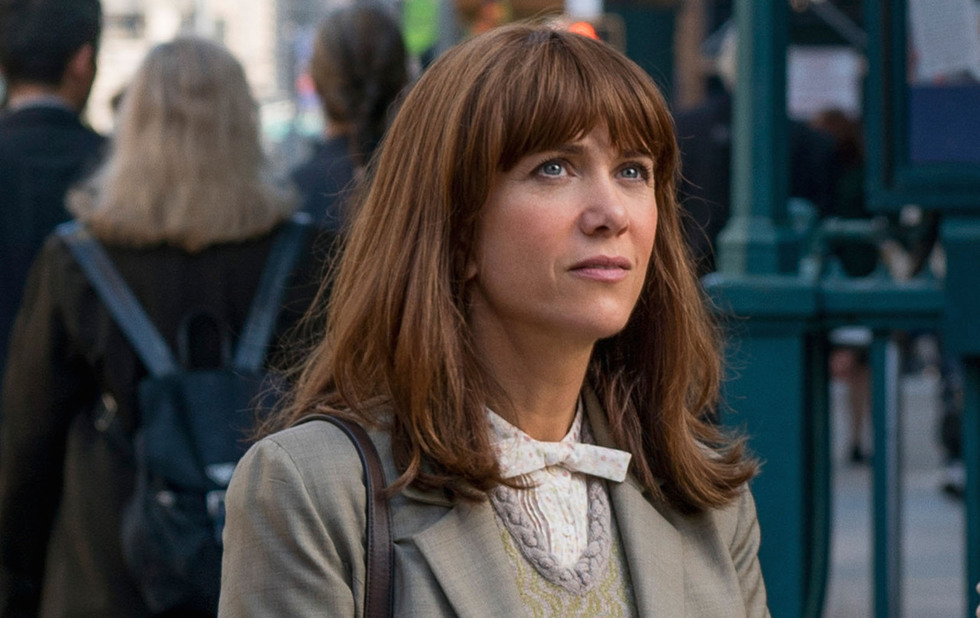
I was at a Loews recently with a friend when we came upon a poster for Zoolander 2. Everyone in the display was easily recognizable, except for one entirely bizarre female figure posing in the background between Ben "Derek Zoolander" Stiller and Owen "Hansel" Wilson. With her painted brows, collagen-plumped lips, catastrophic couture, and golden tripartite hair crown, Wiig resembled Elizabeth Banks' Hunger Games character as played (or worn) by Donatella Versace.
I turned to my friend. "You know that’s Kristen Wiig, right?"
He did a double-take. "No, it’s not. That is not Kristen Wiig."

But it was. And, at this point, the question bears asking: Who can Kristen Wiig not be?
Eleven years after first appearing on Saturday Night Live, the show that made her an Emmy-nominated household name and which she made noteworthy on a weekly basis, Wiig has become an almost alchemical chameleon, a seasoned, sought-after performer who appears identifiably normal in person but whose onscreen likeness remains impressively unfixed to any one impression or persona. What’s strange about her widely-acclaimed ascendance is that Wiig herself is a total anomaly within Hollywood’s current constellation of stars, or even in its wider history. Character actresses have always been a crucial staple of the studio system, but rarely have they been permitted to headline their own vehicles, much less shepherd a broad, midrange comedy about a depressive caught in the chaos of her best friend’s wedding to critical and commercial glory, as both full-fledged star and Oscar-nominated scribe.
Wiig hasn't been the lone leading lady of a mainstream movie since Bridesmaids, a fact worth discussing in and of itself, but what’s even more interesting is how this rubber-faced comedienne has become a welcome mainstay in muted indies, nearly four years after departing the legendary sketch show that routinely highlighted her towering oddities. During her seven-season run on Saturday Night Live, Wiig quickly revealed herself as the key element of the show’s continued relevance, a singular sensation who broke out from the pack not by grandstanding over her cast members, but by creating a stunning coterie of characters and being so damn funny while playing them.

Don’t be mistaken, that’s a feat as rare as it sounds, especially considering that Saturday Night Live’s female alumni have had a particularly rough go once they’re off (or even on) this landmark show. (For every clear female breakout like Gilda Radner, Tina Fey, or Amy Poehler, there’s another Beth Cahill, Ellen Cleghorne, or Cheri Oteri, performers who made substantial impressions while on the show but whose careers stalled out once they left Studio 8H.) But Wiig’s rise seems even more unique than any of her illustrious peers or predecessors. For starters, she's clearly now a movie star, which doesn’t mean that she isn’t willing to pop up on TV in choice projects like a parodical IFC miniseries or a straight-faced Lifetime movie spoof, but the bulk of Wiig's output is happening primarily on the big screen. Most of her contemporaries, on the other hand, make some movies while sticking primarily to the small screen, often in sitcoms that have been fantastic (Fey’s 30 Rock, Poehler’s Parks and Recreation) but just as often forgotten (i.e. Maya Rudolph and Ana Gasteyer in supporting roles on Up All Night and Suburgatory, respectively).
Many of these actresses—Fey, Poehler, Rudolph, Gasteyer, Oteri, as well as Rachel Dratch and Molly Shannon—famously subverted Saturday Night Live’s notorious boy’s club during their coinciding runs, refusing to get saddled with the sort of run-of-the-mill roles (wife, mother, debate moderator) that many skits frequently require but seldom utilize. They created distinctive characters that made big impressions, occasionally indulging in some shameless showboating (which is nothing Will Ferrell hasn’t done) because it was—and, frankly, remains—the only way to break out from the mold on a show as crowded as SNL.
Kristen Wiig didn’t break out from the mold so much as she slyly obliterated it from the inside. She debuted on the show’s 31st season, on a November 2005 episode where she barely made a peep. I first took notice of Wiig the following week, during an episode hosted by Eva Longoria, right in the midst of her Desperate Housewives heyday. That week, in a sketch lampooning what was alleged to be a disastrously catty Vanity Fair cover shoot of the Housewives leading ladies, Wiig was given two lines as Felicity Huffman, the ensemble’s most prestigious member: “Hi, I’m Felicity Huffman. Please don’t make me do anything dumb.” Wiig delivers the lines with blank eyes and dry tones and walks away, spinning comic gold from straw and taking some unexpected laughter with her. It barely lasts five seconds, but in one perfectly droll delivery, Wiig manages to conjure up something shockingly resembling an actual character, not just a punchline. And that’s because, unlike a large number of comedy performers, Kristen Wiig isn’t in the business of simply telling jokes—she’s in the business of acting.
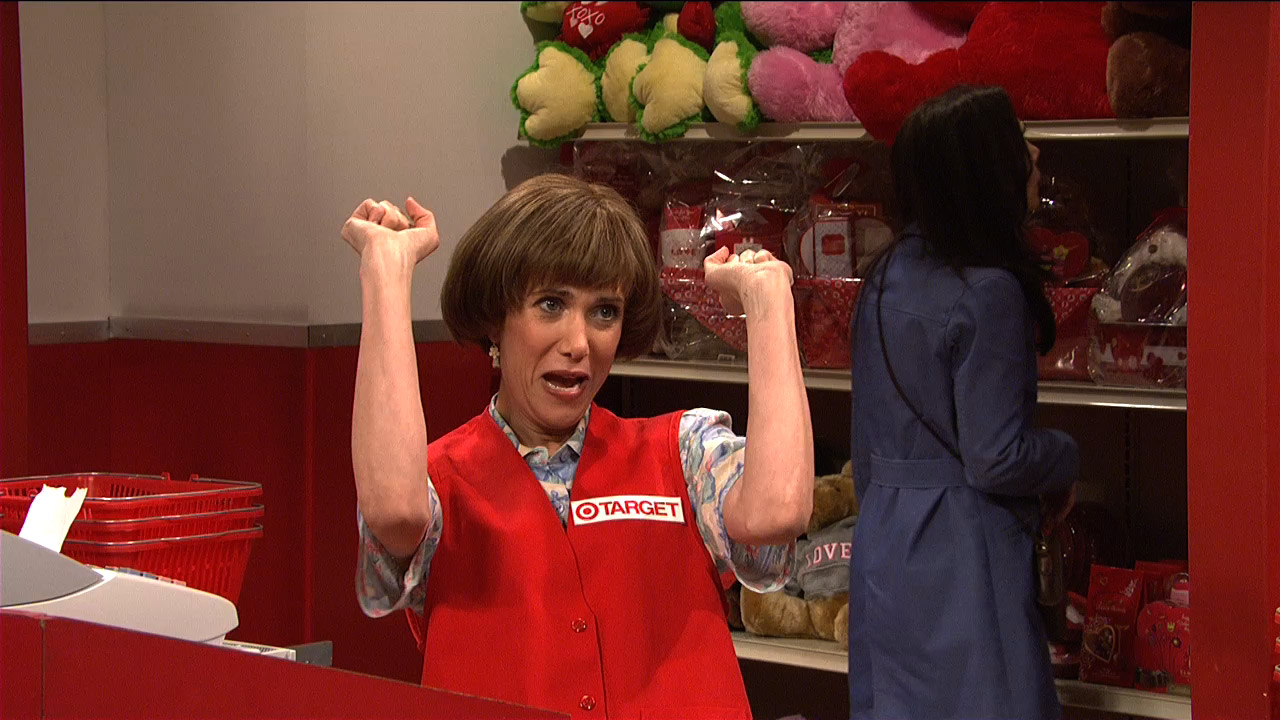
A little more than a decade after that knockout walk-on, Wiig still sits securely at the top of SNL’s caste system as one of its most indisputably versatile MVPs. She's as well known for her own extensive repertoire of original, outré characters (deformed Dooneese, homicidal Gilly, and zippy Target Lady) as she is for her uncanny imitations of famous figures, like Barbie, Liza Minnelli, and Nancy Pelosi. Although seldom a dead ringer for those she impersonates, Wiig manages to make each and every impression a work of idiosyncratic precision, although it’s not necessarily a feat of accurate duplication. She builds from familiarity, sure, but unlike, say, Fey’s eerily identical Sarah Palin, a typical Wiig impersonation is really an act of blowing up a well-known persona, un-defining them so as to stretch past visual or audio recognition and thus fully redefine them. She develops new vocal, gestural, and facial characteristics that make the performance cease to be an impression at all, but instead another of her funhouse mirror creations. You see the character, but you also see the ways in which she’s putting her together, as in her riotous Lana Del Rey impression, in which Wiig nails the sleepy baby voice but also plays someone even more rigid and sedate than the icy chanteuse as we know her.
Wiig commits to all of her characters in a fully-bodied way that aims for but also regularly skews comedy. She can play up or, really, burn through an unappetizing stereotype about a figure we're already acquainted with (Kris Jenner’s crazy-eyed self-absorption, Madonna’s faux-British frigidity, Björk’s chirpy sprightliness, Suze Orman’s cheery edge) so that it feels like we’re laughing at the stereotype, not the person. Wiig may work off our own critical memories of these women, but she has always approached her characters more as a relentless ally than, say, a mocking, mimicking enemy. Sometimes it’s simply too much: her roaring, endlessly-reappearing Kathie Lee Gifford gets more grating than entertaining through the years, as do standbys like her chronic bragger Penelope, but the sheer size and strangeness of Wiig’s live work remains impressive on a meta-performative level. More than any ensemble member in SNL’s history, she forces to us question what exactly makes her uncontained performances funny and why a particular tic or motion or accent compels us to laugh. She has mastered a form of high-strung, high-wire comedy that awakens our collective senses and utilizes big playing in order to obtain both big laughs and big discoveries.
It’s interesting, then, that Wiig’s most notable film performances seem to rely on a penchant for internalization that is more identifiably rooted in the real world than, say, Target Lady's zippy over-talkativeness or Penelope's tyrannical self-absorption, but ultimately no less committed in its comical execution. Bridesmaids hints at this change-of-pace in highly compelling ways. Sure, Wiig is a riot while punching the shit out of a big bridal shower cookie or putting on a sloppy drunk show in that uproarious airplane sequence. But even more memorable is the aching and frequently silent hilarity of Annie, Wiig’s painfully reluctant, deep-in-a-rut maid of honor. This initially comes as a surprise because the elastic features of Wiig’s excellently expressive face should, by all means, make her gawkily unfit for these kinds of contemplative, interiorized roles or too overdone and unpolished for the finer subtleties of film acting. Instead, these qualities actually allow Wiig to turn a character as potentially aloof as Annie into a much more accessible protagonist than we ever see in stories with similar emotional conflicts.

Even in the moments where Annie, the character, is withholding from others onscreen, Wiig, the actress, is using her extraordinary expressivity to telegraph deep uncertainty, right in the middle of a contemporary studio comedy. She layers plenty of jokes and entire arcs with the help of some priceless, well-placed asides but also (and even more so) by being so captivatingly reactive. For instance, Maya Rudolph’s bombshell of an engagement announcement is an amusing scene but also a deeply insightful one because we can so easily detect Annie’s wild panic and her attempts at concealing it through Wiig’s bulging eyes, uneasy smiles, and visible cringes, i.e. deliberate physical choices that deliver some daffy laughs but also discernibly convey a character's inner turmoil. She gives us more with heated flashes of behavior than most actors accomplish with pages of dialogue. And that's just in the first twenty minutes!
Both Wiig’s writing and acting unmistakably reinforce that, regardless of its occasional, purposely outsized distractions, Bridesmaids is actually about something and not just after easy laughs, thus helping us believe and invest in Annie’s very real, very relatable pain. And Wiig's thoroughly perceptive and comically detailed performance in Bridesmaids remains a formerly unimaginable feat: the offbeat character actress as an unflinching Leading Lady, infiltrating our multiplexes and refusing to surrender any of the quirks that make her such a refreshing screen presence in the first place.
In the years since Bridesmaids, which was importantly both an artistic coup and a box office bonanza, Wiig has settled into an impressive position within contemporary film as a performer who’s uniquely adept at zig-zagging between popular studio fare (the Anchorman and Zoolander sequels and the upcoming, sure-to-be-major Ghostbusters reboot) and tiny indie movies that all but require a performer of Wiig’s renown to even get greenlit in the first place. 2015 was a prolific banner year for Wiig that saw the actress take on roles in various indie productions like Marielle Heller's The Diary of a Teenage Girl, Sebastián Silva's Nasty Baby, and Shira Piven's Welcome to Me, as well as popping up as the most wittily exasperated member of The Martian’s headquartered NASA team, plus TV roles in A Deadly Adoption, The Spoils Before Dying, and Wet Hot American Summer: First Day of Camp. What’s intriguing about this industry criss-crossing is that Wiig’s roles in the big-budget stuff are often just as partial to her deadpan gifts and Dada-adjacent eccentricities as the indie projects.
Wiig’s pop-up performances are always fun to clock and recall even when they only last for a matter of minutes and the movies themselves are far-flung memories. I don’t remember much about Knocked Up and Forgetting Sarah Marshall, but I certainly recall Wiig cobbling together a performance from bits and pieces and eclipsing her better-known co-stars as, respectively, an E! News higher-up barely able to cover her passive-aggressive disdain for pregnant colleague Katherine Heigl and a wry yoga instructor with the serious hots for Russell Brand. Wiig seizes these spare moments in dubious (and even baldly sexist) scripts and gives them added value by flexing the humor that interests her, which is more often than not the type that exists beyond the page. She builds these characters from the ground up, from material where there was often never a character at all, just assorted foibles.
More recently, her cuckoo love interest Chani Lastnamé in Anchorman 2 and Zoolander 2’s cracked Russian villainess are surely two of the weirdest characters to grace a Hollywood entertainment in the last few years and I wonder if such kooks would even be written into these movies were it not for for the possibility of casting Wiig herself. She continues to make such surreally specific personalities into surprisingly palatable audience-pleasers, allowing her penchant for the unconventional to seep into the mainstream in ever more noticeable ways.

Even so, it’s clearly the indie scene where Wiig is embarking on her gutsiest explorations and delivering her most creatively intricate performances to-date. Sure, projects like Girl Most Likely and Hateship, Loveship were non-starters, even when Wiig proved an invaluably vital resource to both their financial backing and artistic visions, however misjudged or ignored. But she's a brittle, self-loathing marvel playing brother-and-sister with SNL colleague Bill Hader in Craig Johnson’s underrated dramedy The Skeleton Twins and her lively take on a blowzy single mom in the wondrous Diary of a Teenage Girl is one of 2015’s most consummate supporting turns.
Welcome to Me remains the most fascinating and precarious gambit in Wiig’s career thus far, a veritable Rorschach test of dicey, left-of-center comedic conviction from its tireless leading lady, who is more or less the film’s entire reason for being. As Alice Klieg, a woman with borderline personality disorder who uses her lottery winnings to bankroll her own daytime talk show, Wiig offers something completely and compellingly different in contemporary film: a fresh and nuanced take on mental illness, relieved of any Oscar-ready Nobility and instead injected with some of the most nervy and potentially alienating anti-humor ever put on screen.
It’s an uncompromisingly original work whose riskiest efforts don’t always resonate. But it’s hard to remember what doesn’t work in the face of Wiig’s boldly out-there artistry, which sells the hilarity and the humanity of Alice while pushing her vanity, obliviousness, and stiltedness past any known point of reassuring comfort. That a character this prone to severity and impenetrability connects even in the slightest with audiences is an unadulterated testament to Wiig's talents. She’s like a sad clown who can’t be bothered to put on her makeup, which may be a fitting and flexible description for a lot of Wiig’s characters. But Welcome to Me is altogether braver than anything Wiig has ever done, emanating from a richly stimulating core of atypical human experience and even more revealing of what’s to come from the actress, especially if she continues to cling to (and hopefully create) projects as hilariously and compassionately multifaceted as the ones on her résumé thus far.

I’m not sure if Zoolander 2 will offer anything as instantly inspired as Wiig’s severely warped fashion zombie, or if that dynamically distaff Ghostbusters redo will elicit anything particularly new from Wiig, but I’ll still be there on opening day to see her cutting it up with comediennes as charming as Leslie Jones, Melissa McCarthy, and Kate McKinnon. She seems to inhabit an entirely different plane of transformative, warts-and-all comedy than even her closest contemporaries, like Rudolph (who hardly gets the opportunities) and McCarthy (who only offers up these characterizations in big-ticket vehicles). And even if you still don't get the sense that she's always acting with frames or angles in mind, like a more disciplined performer might, Wiig makes up for it in spades with a daunting sense of daring that remains unmatched by any performer working today and not only the comic ones.
Wiig disappears into different identities just as ingeniously, and with as little regard for definitive star personas or personal priorities, as the Streeps, Blanchetts, and Swintons of the business. She's been doing so since the early days of Saturday Night Live, even if the patently comedic intents of her embodiments continually threaten to lessen their acclaim and prize potential. Still, it's invigorating to see her consistently use the character actress qualities that might typically restrict her casting opportunities in the service of roles that directly require them. Wiig exists beneath her characters, confident enough in her own abilities to place their needs before her own, so that even when the characters themselves are vain or insecure, which they frequently are, there's no vanity or insecurity to be found in the performances themselves, a commendable feat in an industry in which those constrictive qualities frequently run hand-in-hand.
There really isn't any other performer quite like Kristen Wiig, the incomparable misfit who made Hollywood laugh so hard that it didn't even realize it was breaking all its own conventions by letting someone so proudly peculiar past its studio gates. You would think that some industry gatekeepers might have kicked her out by now, but maybe they actually recognize the infinite value of her sublime versatility, even if directors, producers, and casting agents could admittedly tap into it with more frequency, centrality, and imagination. Who knows, maybe these gatekeepers knew from the very start what they were doing by letting her in. Maybe she is exactly what they—and we—have been missing all along.
